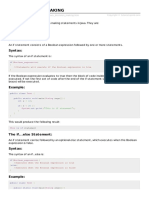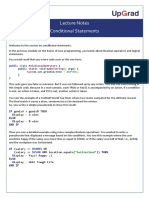Reviewer - Chapter III: Conditions
Overview:
- In real life, decisions depend on certain conditions (e.g.,
passing/failing a student).
- In programming, we use Boolean data types, relational and
logical operators to create conditions.
- Java supports decision-making with if, if-else, multi-if, and
switch statements.
Relational Operators (Comparison Operators) and their Meanings:
- == : Equal to (True if both values are the same)
- != : Not equal to (True if values are different)
- > : Greater than (True if left value is larger than right
value)
- < : Less than (True if left value is smaller than right value)
- >= : Greater than or equal to (True if left value is larger than
or equal to right value)
- <= : Less than or equal to (True if left value is smaller than
or equal to right value)
- Example: if (grade >= 75) — checks if grade is passing.
Logical Operators:
- Combine multiple conditions:
- && (AND): True if both conditions are true.
- || (OR): True if at least one condition is true.
- ! (NOT): True if condition is false.
- ^ (XOR): True if conditions differ.
Compound Expressions:
- Using logical operators to connect multiple boolean expressions.
Conditional Statements:
- If: Executes block if condition is true.
- If-else: If condition is true, do block A; else, do block B.
- Multi-if (if-else if): Checks multiple conditions in sequence.
Switch Statement:
- Tests a variable against several possible values (cases).
- Uses break to prevent fall-through.
- Default handles unmatched cases.
---
Sample Java Code: Conditions
public class ConditionsExample {
public static void main(String[] args) {
int grade = 85;
// IF Statement
if (grade >= 75) {
System.out.println("You passed!");
� } else {
System.out.println("You failed!");
}
// MULTI-IF Example
if (grade >= 90) {
System.out.println("Excellent!");
} else if (grade >= 80) {
System.out.println("Very Good!");
} else if (grade >= 75) {
System.out.println("Good!");
} else {
System.out.println("Needs Improvement.");
}
// SWITCH Example
int day = 3; // 1=Monday, 2=Tuesday, 3=Wednesday, etc.
switch (day) {
case 1:
System.out.println("Monday");
break;
case 2:
System.out.println("Tuesday");
break;
case 3:
System.out.println("Wednesday");
break;
default:
System.out.println("Invalid day");
break;
}
}
}




























































































